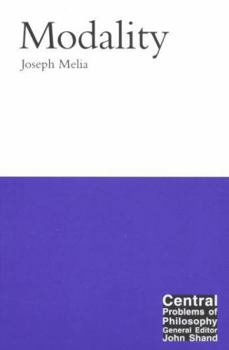Modality
(Part of the Central Problems of Philosophy Series)
More and more philosophers are using modal notions to solve problems and analyse concepts. In his introduction to the topic of modality Joseph Melia focuses on possible worlds as the best way to understand the nature of necessity. Melia demonstrates how different theories about possible worlds not only influence our more general modal beliefs but illustrate and illuminate various methodological considerations, such as the degree to which any philosophical theory ought to respect common sense. The book begins by introducing readers to various notions of possibility, the de re/de dicto distinction, and the ubiquity of our modal concepts. It then presents an accessible introduction to modal logic and possible worlds semantics. Melia argues that by including possible worlds in our metaphysics, we can justify such formal semantics, refute Quine's modal scepticism, and make sense of our ordinary thought and talk about the modal. Various theories of possible worlds are critically examined, including David Lewis' extreme realism, Alvin Plantinga's moderate realism, David Armstrong's combinatorialism, and the linguistic theory. The book is accessible and engaging throughout and will be welcomed by students looking for a non-technical introduction to a much discussed and contested area of philosophical inquiry. Book jacket.
Format:Paperback
Language:English
ISBN:0773524819
ISBN13:9780773524811
Release Date:December 2003
Publisher:McGill-Queen's University Press
Length:190 Pages
Weight:0.50 lbs.
Dimensions:0.6" x 5.1" x 7.7"
Related Subjects
PhilosophyCustomer Reviews
0 rating





